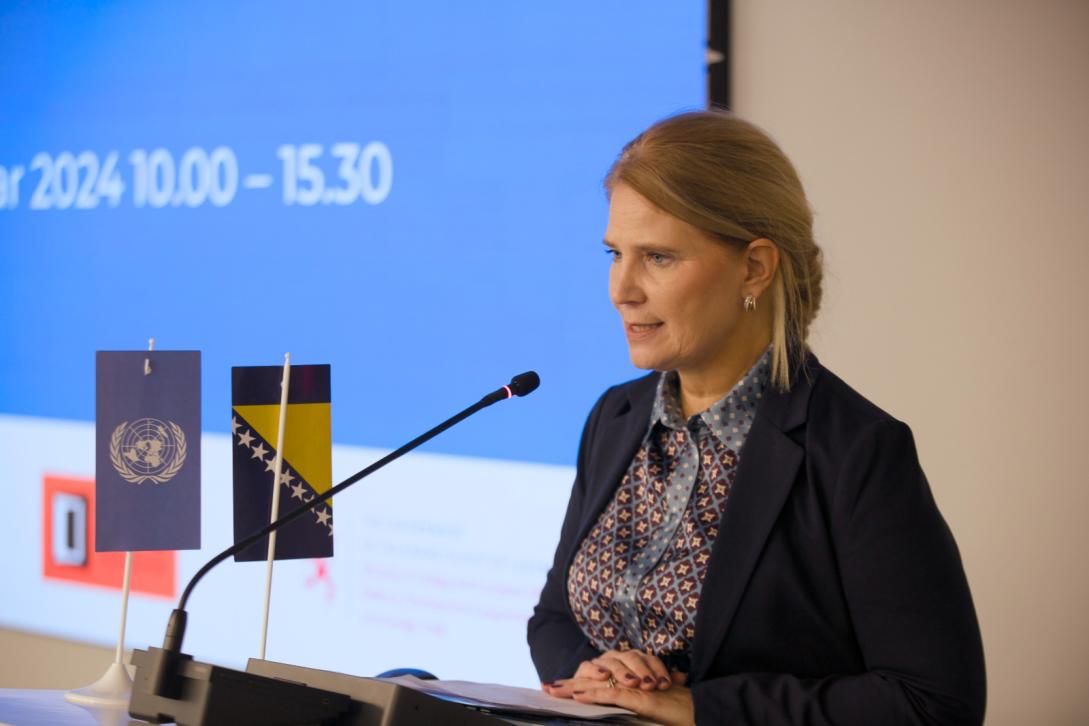
On 28 November 2024, the United Nations in Bosnia and Herzegovina hosted a consultation on reparations for civilian victims of the 1992-1995 war at the United Nations House in Sarajevo. The event was jointly organized by the Office of the United Nations High Commissioner for Human Rights (OHCHR), Trial International in Bosnia and Herzegovina, and the European Union in Bosnia and Herzegovina.
The consultation aimed to foster dialogue among stakeholders on various forms of reparation, review progress achieved, identify outstanding gaps and obstacles in light of Bosnia and Herzegovina’s international human rights obligations, and propose concrete recommendations to address existing challenges. It brought together associations of survivors and families of victims, representatives of authorities, civil society organizations, academia, and international stakeholders.
Discussions highlighted that nearly 30 years after the war in Bosnia and Herzegovina, addressing reparation for civilian victims remains a significant challenge. While some efforts have been made, many victims have yet to claim or receive adequate reparation. Inconsistent legal frameworks across the country and various legal and administrative hurdles further exacerbate the trauma experienced by victims. Collective forms of reparation, including memorialization efforts and guarantees of non-recurrence, are often fragmented and rarely involve victims in consultation processes.
Ingrid Macdonald, United Nations Resident Coordinator in Bosnia and Herzegovina, opened the discussions and emphasized the central role of reparation in transitional justice: “I commend the tireless efforts of survivors, families, and NGOs who, for over three decades, have championed truth and justice, in the face of great adversity. Their work is essential to peacebuilding. While no measure can erase the trauma endured, reparation—both individual and collective—can restore dignity, rebuild trust, and offer hope. As we approach the 30thanniversary of the Dayton Peace Agreement, we must address persistent gaps and work toward an inclusive reparation framework that serves all victims.”
Duška Jurišić, Deputy Minister for Human Rights and Refugees of Bosnia and Herzegovina, emphasized that ensuring fair and adequate compensation and rehabilitation for victims is not only a legal obligation but also a moral imperative. She stressed that, despite political challenges, all victims – regardless of their ethnic background – must have equal treatment and access to their rights. “The United Nations Committee Against Torture has reminded us of the binding international obligations – legal, financial, and moral: to provide reparation, free healthcare, psychological support, and a formal public apology. Establishing an effective national compensation program to offer legal protection to victims of war crimes, including survivors of sexual violence, and adopting a framework law on the rights of victims of war torture is a mission we cannot abandon. Injustice can be corrected if those responsible for addressing it are held accountable. The responsibility for upholding the rights of wartime torture survivors’ rests with all of us. We must also recognize the transgenerational impact of wartime trauma. Effectively addressing such trauma is the only path to building a healthy and prosperous society.”
Elisabet Tomasinec, Head of the Political Department at the European Union Special Representative Office in Bosnia and Herzegovina, highlighted the broader significance of reparation: “Reparation for victims is more than an act of justice; it lays the foundation for a stable, secure, and prosperous Bosnia and Herzegovina within the European Union. Upholding victims’ rights is essential for building a peaceful future, and the European Union will continue to support Bosnia and Herzegovina on its path to reconciliation and European Union integration.”
“Due to the fact that Bosnia and Herzegovina has not yet managed to adopt a unified legal reparation framework at the state level, we have a fragmented approach that fuels inequality, frustration and resentment among victims, as many continue to remain without effective and adequate rights. In addition, in order to exercise their rights, they are often exposed to a labyrinth of difficult-to-navigate administrative procedures. Reparations for civilian victims of war, while integrating gender-sensitive policies so that all victims have equal access to war compensation, rehabilitation, memorialization, recognition of crimes and victims, and building trust are just some of the key factors for Bosnia and Herzegovina’s progress in the field of reparations,” emphasized Selma Korjenić, Program Manager, Trial International – Office in Bosnia and Herzegovina.
Agnes Picod, Senior Human Rights Adviser at the United Nations in Bosnia and Herzegovina, concluded the consultation by emphasizing that reparation is an obligation of the State: “International law recognizes the right to remedy and reparation for victims of gross violations of human rights and humanitarian law. As a party to international human rights treaties, Bosnia and Herzegovina is obligated to ensure comprehensive transitional justice measures, including recognition and adequate reparation for all civilian victims of the war, without discrimination. These measures are vital not only for survivors and their families but also for sustaining peace.”
The consultation underscored the pressing necessity for concrete and coordinated actions to deliver meaningful reparation, including individual compensation, medical and psychological support, symbolic and collective measures. Effectively addressing the enduring consequences of the war is fundamental to fostering reconciliation and building a peaceful, inclusive future for Bosnia and Herzegovina, according to the EU Delegation in BiH.
Photo: UN in BiH

